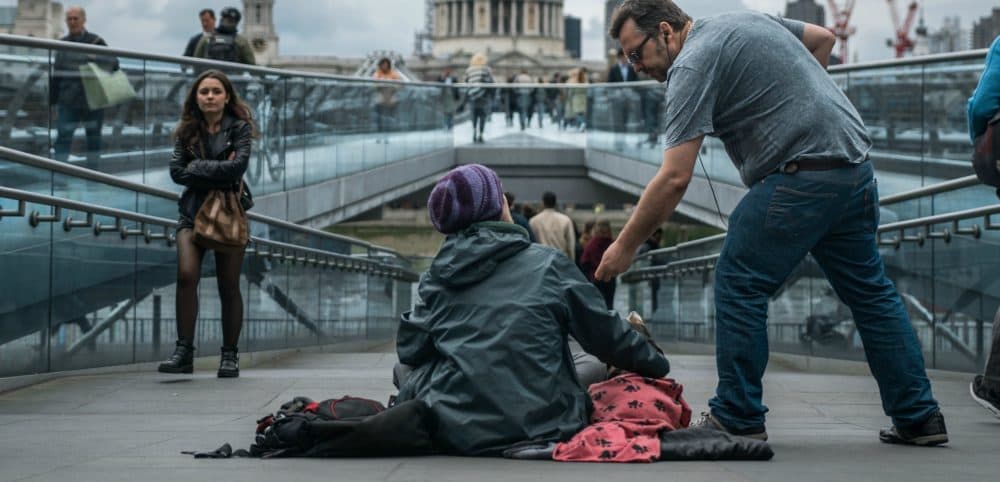Advertisement
Commentary
Who's Worthy Of Our Spare Change? Better Question — Who Are We To Decide?

For the past couple of years, I’ve been trying to give some coins or a dollar to each homeless person on the street who asks me for money — or sets out a cup or a sign. I don’t live in the city, so the issue is only alive for me a couple of days a week.
A friend came to the idea before me, and I thought it was worth emulating. (He has since observed that when he travels to San Francisco there are so many homeless people now that he can’t keep up.)
While I am by no means perfect in executing my own intention — sometimes I withdraw or avoid people without thinking, sometimes I quickly run out of cash — I’m better than I used to be. And, after years of wobbling, I have come to feel it’s the best approach for me. I no longer try to decide about anyone in the moment.
Talking with friends or colleagues about this notion hasn’t always been smooth. I’ve been told I’m a fool more than once, that I’m naïve, and I’m supporting addicts, alcoholics, con men, liars and thieves — which is no doubt true in some cases. Many people feel you should give only to those who “deserve” your help, or who spend the money in the right way, not just anyone. You should let agencies decide.
Such opinions are not news. For hundreds of years — likely longer -- folks without money have been divided into “worthy” and “unworthy,” depending on how prudent and striving someone else — a neighbor or a church, a charity or a politician — deems them to be.
The more I think about such sorting, the more it feels deeply wrong. How can we presume to know?
So many of the most impairing injuries people carry are invisible to outside eyes. Do we have magic glasses that reveal their hearts, or the obstacles they are facing and have faced? And so much of our judgment comes from a vain fantasy that we could manage better in their place. I know I wouldn’t last a week on the street without going at least half mad — maybe worse.
[A country] is only as great as the care it offers to its most unlucky and vulnerable citizens.
Let’s do a thought experiment: What if we change the names of the players. What if we only let the “worthy” rich keep their hoards? What if we insist that all billionaires pass a test that shows they earned their money honorably — that they obeyed tax laws, paid their workers fairly (including the ones in places like Indonesia and India), didn’t discriminate against women or minorities, guarded against negative environmental impact, and never advertised falsely.
You get my point.
Better yet, what if we judged the way they treated their spouses, how much they drank, whether they had ever snorted cocaine or groped their staff? If it turned out they weren’t so virtuous either at work or at home, we wouldn’t let them keep their wealth — even offshore.
We embrace the preposterous myth that all the wealthy earned their money through hard work, virtue, honesty and unusual talent while the homeless poor squandered their lives.
It brings to mind the appalling comment Senator Chuck Grassley made recently in his crass effort to justify killing the estate tax — a tax that only affects the very rich when it’s in place but, removed, effects the nation. He suggested that anyone who isn’t “investing” (i.e. doesn’t have income to invest) isn’t contributing as much to society as the rich, and is likely just wasting money on “women, movies and booze.” While Grassley's sentiment is ridiculous, it is not unusual these days.
Meanwhile, according to the 2017 HUD report, on any given night over half a million Americans are homeless — 553,742 on the night they did the actual sample count. The number is shameful, so people who don’t believe in safety nets or “entitlement” programs, can justify their position only by trying to impugn the homeless themselves.
In reality, the poor and the homeless are us with bad luck. We’d rather think that it’s about personal virtues, that they could prosper, were it not for moral failings. It’s been oft said, but it bears repeating: the only way the myth of super-capitalism can endure is if the reality of its exploitative core is kept obscured.
I hope someday I can stop passing along small bits of money. I’ll recognize that time when it comes because Americans will have open-ended, generous mental health benefits and affordable health care; will be offered easily accessible addiction treatment; and will have access to jobs that pay a living wage as well as safe housing, safe neighborhoods, and safe schools. I’ll know it because our country will finally realize it is only as great as the care it offers to its most unlucky and vulnerable citizens.
